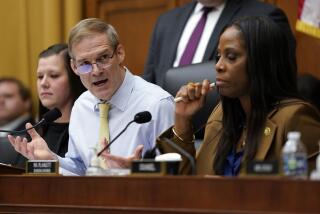U.S. Credibility Under Fire
Commanders in chief can’t always offer unequivocal candor about military affairs. In 1940, Franklin Roosevelt quietly shipped destroyers to England; that act, history has decided, proved to be a blessing. But disaster followed when Lyndon Johnson exploited the Gulf of Tonkin incident to escalate the U.S. role in Vietnam.
Now President Bush and his administration march perilously close to crossing the line in giving Americans -- and the world -- questionable information on the U.S. involvement in Iraq.
It’s becoming a pattern: The administration acts on what it declares to be good intelligence. Then, reality gets shrouded in uncertainty.
The U.S. assault on a six-vehicle convoy earlier this month near the Iraqi city of Qaim illustrates the problem. U.S. officials relied on what they first said was sound intelligence indicating that Saddam Hussein and his sons were part of the convoy. Now they concede there’s no evidence they were. Instead, the world learned that U.S. troops wiped out a tiny village of Bedouins. U.S. military vehicles then sealed the area to prevent journalists from entering.
Nor is there greater clarity on the biggest intelligence issue -- Iraq’s disputed weapons of mass destruction. More allegations emerge almost daily concerning State Department and CIA analysts being pressured to alter threat assessments. A United Nations special terrorism committee says it finds no evidence of Al Qaeda-Iraq ties, links that Bush officials insist exist. But the White House is blocking a thorough congressional investigation of prewar Iraq intelligence.
The June 30 New Republic reports that Vice President Dick Cheney told Senate Republicans in a June 4 Capitol Hill visit to back off; Sen. John Warner (R-Va.), chairman of the Senate Armed Services Committee, promptly retreated from his call for public hearings. On Friday, the committee’s Democrats split with Warner and said they would conduct their own intelligence examination using Democratic staffers.
On Thursday, the House rejected two amendments in its intelligence spending bill, which was passed Friday. One amendment, by Rep. Dennis J. Kucinich (D-Ohio), was just a fishing expedition against Cheney and the CIA. But the other amendment, by Rep. Sheila Jackson-Lee (D-Texas), would have let the comptroller general examine how much U.S. intelligence was shared with U.N. inspectors before the war.
The White House argued that Iraq’s banned weapons were ubiquitous and would be easy to find. But if Bush officials balk at tough scrutiny of the U.S. intelligence we’ve seen so far, how will they inspire American and global confidence in the future if our intelligence tells us we must take other military action?
More to Read
Sign up for Essential California
The most important California stories and recommendations in your inbox every morning.
You may occasionally receive promotional content from the Los Angeles Times.










